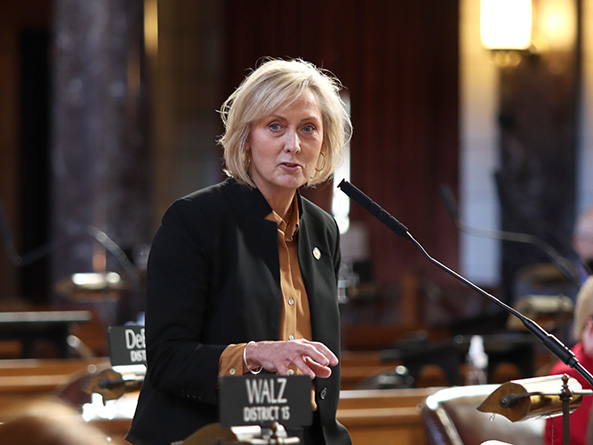School funding proposal held on first round
A proposal to modify Nebraska’s school funding formula and direct additional state aid to public schools was held on general file Feb. 11.
Under LB890, introduced by Fremont Sen. Lynne Walz, each district would receive education stabilization base aid (ESBA) paid from a new trust fund. The bill also would increase the allocation of state income taxes to school districts from the current 2.23 percent to 20 percent in 2023-24.
Additionally, LB890 would decrease the local effort rate — a component of the school funding formula that uses property valuation to determine how much a district can contribute in property taxes to fund a school.
Walz said LB890 would reduce school property tax askings by approximately $728 million when fully implemented and ensure that many more schools receive equalization aid, which is intended to cover the difference between a district’s resources and its needs.
LB891, a companion bill introduced by Sen. Brett Lindstrom of Omaha, would modify school levy authority and adjust the state’s tax code to fund the additional aid.
In addition to allocating a portion of state sales and use tax proceeds to the ESBA trust fund, Lindstrom’s proposal would end the distribution of refundable income tax credits under the Nebraska Property Tax Incentive Act, created by LB1107 in 2020, and reallocate that money to school funding.
The credit, currently funded at $548 million, is based on the amount an eligible taxpayer paid in property taxes to their school district during the previous year.
A pending Education Committee amendment would replace the bill with a modified version. In addition to other changes, Walz said, it would ensure that each school district receives at least 20 percent of its basic funding from the state.
Walz said she would introduce an amendment to remove that provision.
Lindstrom supported LB890. Even though it and LB891 would not provide the same amount of property tax relief as the LB1107 credit initially, he said, they would be a more sustainable way to address high property taxes and ensure that state aid is more fairly distributed among all school districts.
Albion Sen. Tom Briese opposed LB890, saying repurposing the LB1107 credit to fund additional aid is a “nonstarter.” At its current amount, Briese said, the credit provides a 25 percent reduction on school property taxes paid, and taxpayers in many small, rural, unequalized districts would receive a smaller property tax savings under LB890.
Briese said he agrees that the state should direct additional funding to public education but that any proposal to do so should include a “reasonable cap” on increases in school property tax askings.
Sen. Lou Ann Linehan of Elkhorn, chairperson of the Revenue Committee, also opposed the bill. She said she is “quite certain” that LB891 will not advance to general file and questioned how its proposed sales tax allocation would affect the state budget.
Additionally, Linehan said, the proposed repeal of net option funding in LB890 would discourage schools from accepting option students. She further questioned why the basic funding provision — which had been requested by small, rural schools — should be removed from the committee amendment.
After several hours of debate over three days, Speaker Mike Hilgers of Lincoln placed a hold on LB890 at Walz’s request. Hilgers said the bill will not return to the agenda unless its supporters and primary opponents can reach an agreement.


